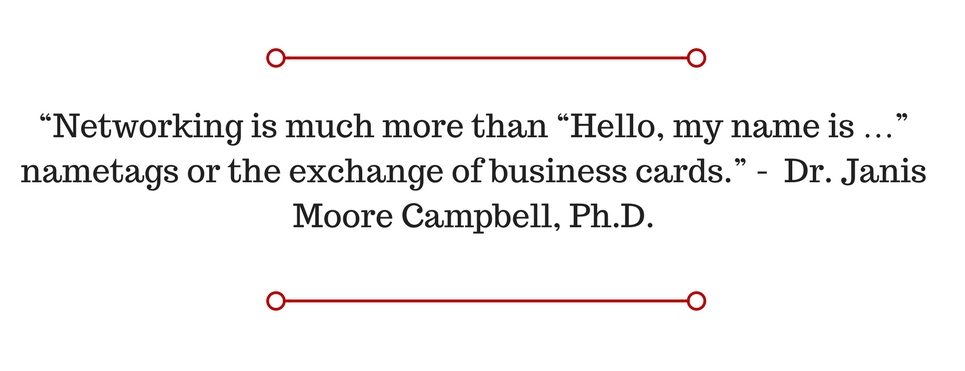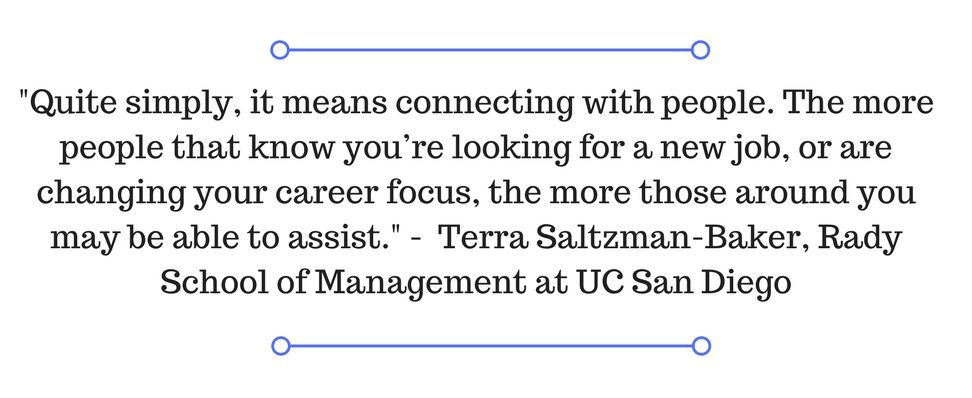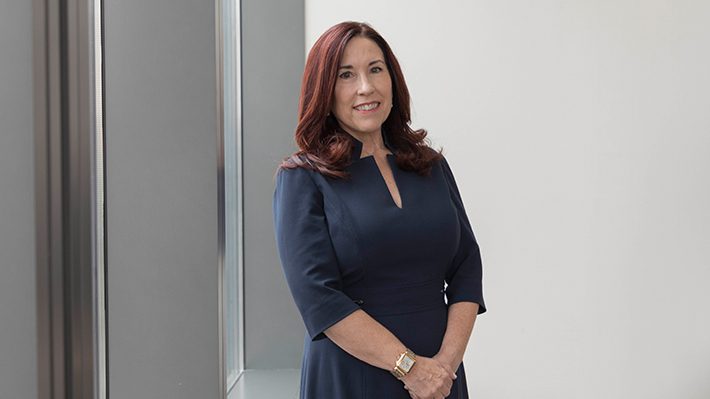Search results for :
What MBAs Should Know About BMO Financial
BMO Financial Group, established in 1817 as Bank of Montreal, is one of the largest diversified financial service providers in North America. According to BMO, more than 45,000 employees serve the financial needs of more than 12 million customers. Continue reading…
Networking Strategies for MBAs Before and After Graduation, Pt. II
The first installment of this series highlighted the fundamental importance that networking plays in a job search and outlined some of its basic strategies. Quick recap: start with friends and acquaintances; present yourself professionally on social media; and remember that the best networks are built from mutually beneficial relationships. This second article offers more nuanced networking tips tailored specifically to MBAs.
One of the best ways for an MBA student to grow their network is simply to volunteer their time. By seeking ways to volunteer in their desired field, one can expand a network by demonstrating their knowledge and experience to others.
Dr. Janis Moore Campbell, Ph.D., the Director of Graduate Professional Development at Temple University’s Fox School of Business, explains that volunteering is a great way to build relationships. “Without fail, others will gravitate to you if you are willing to share your knowledge and expertise. Before, during and after your MBA, strategic volunteering is an outstanding way to showcase one’s knowledge, skills, and generous spirit.”
While it is critical to offer to share your talents, remember that time is a scarce resource. Focus on getting involved in projects that will yield the most benefit. Dr. Campbell notes, “It’s important to think strategically about how best to demonstrate your strengths.”
Current MBA students should take advantage of the resources that their schools provide. Many schools have well established programs that are designed to aid in the process of networking. For example, Beth Briggs, the Assistant Dean in Career Services at the NYU Stern School of Business, points out that in her school’s MBA program, “Students participate in our career education program … which, among other services, helps MBAs become more conversant in their skill sets and personal stories, identify whom it makes sense to network with based on their goals, and then leverage Stern’s relationships and their own contacts to make those connections.” Other MBA schools have similar programs, and they should be thought of as a crucial part of the curriculum.

Another key way to capitalize on your school’s assets is to make use of the alumni network. Schools will often facilitate meet-ups between current and former students, and attending alumni events, for example, is a great way to forge new connections. Linking up with your school’s alumni is a crucial part of networking for any MBA student. Stephanie Johnson, Director of MBA/MS Career Services at Drexel University’s LeBow College of Business in Philadelphia recommends, for example, that MBA students should “set weekly goals to attend at least one event and reach out to one to two alumni for informational conversations.” Contacting and talking to past graduates is not just about meeting new people and building your network. Alumni have been in your shoes, and will have essential advice to help you move forward.
Finally, remember that networking does not stop after you have found a job. As Mark Brostoff, Assistant Dean and Director of Graduate Career Services at the USC Marshall School of Business reminds us, “Having a vibrant network of professional contacts is a valuable resource to cultivate and maintain, even after landing the job.” Perhaps the best lesson is that networking is mostly about creating healthy and fruitful partnerships. A strong network is a web made of vibrant relationships, and it is a serious mistake to neglect those bonds. It is also necessary to remember not to spread yourself too thin or to focus solely on networking when finding employment.
“You need not name-drop or be a social butterfly to build a strong network of friends and colleagues” adds Dr. Campbell. “Networking is much more than “Hello, my name is …” nametags or the exchange of business cards.”
Use These Key MBA Networking Strategies Before and After Graduation
In a competitive job market, current MBA students and recent graduates need to figure out how to stand out among their peers and make themselves attractive to potential employers. One of the most fundamental ways MBAs can maximize employment prospects, is to improve their networking skills.
Networking may be more than just a good employment strategy—it is actually a vital tool. According to Mark Brostoff, Assistant Dean and Director of Graduate Career Services at USC Marshall, “A successful job search begins and ends with successful networking. Networking should be one of the primary job search tools when pursuing a career,” he told MetroMBA.
With the advent of social media, networking is now an everyday part of our lives. Your internet presence is now a huge part of your job search. Brostoff highlights the unique value of maintaining the right kind of web profile: “Networking these days are [sic] both personal, as well as online, so maintaining a professional online appearance is extremely important before, during and after graduation.” Always keep in mind that while social media is a great way to communicate with friends and family, your online accounts are also a way of presenting yourself to potential employers.
The idea of MBA networking strategies may seem mystifying at first but as Terra Saltzman-Baker, the Director of Career Connections at UCSD’s Rady School of Management, assures, the idea is more ingrained within us than it may seem. “Quite simply, it means connecting with people. The more people that know you’re looking for a new job, or are changing your career focus, the more those around you may be able to assist.”
Successful MBA networking strategies are not only about reaching out to employers. An equally important move, and the first step in the process, is to inform those around you about career plans and ambitions. You never know how those in your social circle may be able to connect you to your ideal job. As Saltzman-Baker puts it, “it’s not just about the person you’re talking with, but those in their circle that they may think to connect you to.”

While it is a sensible move to use all of the online tools at your disposal, remember not to rely solely on the online communication that those platforms provide. Networking is all about building real relationships with others. At the heart of networking means valuing the quality of connections over quantity. Furthermore, connecting with others is not about simply finding those who can help you in your job search. Rather, the best networks benefit everyone involved. “Never mistake activity for progress,” says Dr. Janis Moore Campbell, Ph.D., the Director of Graduate Professional Development at Temple’s Fox School of Business.
“The best networking happens when people gather to learn from one another or to help one another,” she continues.
Stephanie Johnson, the Director of MBA/MS Career Services at Drexel University’s LeBow College of Business, also stresses that both parties must work together in order for the relationship to have any value. “Remember that networking is a reciprocal relationship, whenever possible, build mutually useful relationships where you aim to give before you expect something in return. In other words: “those who have given also receive.”

Stephanie Johnson, Director, MBA/MS Career Services – Photo via Drexel.edu
Perhaps one of the best MBA networking strategies is that it is never too early to start. The most successful networks are built before an MBA candidate begins their program, and then continue to evolve during and after school. Saltzman-Baker frames it simply: “The key is to start early. Don’t wait until you’re looking to make a change to use this strategy, but instead keep this up on a regular basis—you never know what may happen!”
What Should You Study? Finance vs. Marketing MBAs
George Harrison, in his final album Brainwashed, has a line in a song that goes, “We pay the price with a spin of a wheel / with a roll of a dice / Ah yeah, you pay your fare and if you don’t know where you’re going / any road will take you there.”
Kings of the North: Should You Get a Part-Time MBA in Chicago or Toronto?
In many ways, Chicago and Toronto are very similar world class cities: Both are situated on a Great Lake, host an “Original Six” hockey team, and both metros suffer from “second city” inferiority complexes. Both metros also have plenty of competitive business school options for professionals who want to earn an MBA. Continue reading…
Showdown: Find Out if You Should Get an MBA in New York City or Los Angeles
The battle for hip-hop supremacy may have ended in the ’90s, but we can keep the East Coast-West Coast beef alive while looking at full-time MBA programs in New York City and Los Angeles.
Both cities are home to top business schools and are ripe with employment opportunities in booming industries. But which is best for you? Let’s take a deeper dive.
Location
We’ll start with location, location, location.
The most bustling city in the country, NYC is is the capital of the business world. More Fortune 500 companies are headquartered here than in any other city. The city is not only home to Wall Street and the world’s largest financial institutions, but also some of the largest media, marketing, and advertising companies. While New York City can be daunting in its size, it’s also furiously expensive to live in, so it may not be for everyone. Getting to know the city’s vast public transportation system is a must and it can get pretty cold in the winter, so if you’re looking for beaches, keep reading.
Meanwhile, LA is Tinseltown. The city’s economy is driven by entertainment industries like television, film, video games, music recording, and production, but also by international trade, technology, petroleum, fashion, apparel, finance, telecommunications, and tourism. In the 2017 Global Financial Centres Index, Los Angeles was ranked as having the 19th most competitive financial center in the world, and sixth most competitive in United States. The city is also the largest manufacturing center in the western United States, with the ports of Los Angeles and Long Beach comprising the fifth-busiest port in the world and a vital trade route within the Pacific Rim.
New York City Full-Time MBA Programs
Full-time MBA Programs in New York City include:
- Stern School of Business – New York University
- Gabelli School of Business – Fordham University
- Columbia Business School
- Zicklin School of Business – Baruch College
What stands out about these programs?
A Columbia MBA opens up countless career options and is sure to pay off in the long run: The average starting salaries for Columbia MBAs is $104,000, with 37 percent of full-time MBA of graduates being employed in the financial services industry.
Meanwhile, Stern’s MBA curriculum gives students tons of flexibility, and allows degree seekers to choose one or two MBA specializations, NYU allows up to three specializations from 20 plus options.
Both Gabelli and Zicklin’s full-time programs feature cohort-based structures. Gabelli’s program features a New York immersion experience where, over the course of five days, students are exposed to a number of company visits with corporations like Deutsche Bank, Money.net, and Hewlett Packard. As an alternative to completing a major, Zicklin students may pursue a joint JD/MBA in conjunction with Brooklyn Law School or New York Law School.
Los Angeles Full-Time MBA Programs
Full-time MBA Programs in Los Angeles include:
- Anderson School of Management – UCLA
- Argyros School of Business – Chapman University
- Graziadio School of Business and Management – Pepperdine University
- Marshall School of Business – USC
- Peter F. Drucker and Masatoshi Ito Graduate School of Management – Claremont Graduate University
What’s special about these MBA programs?
Anderson features a Business Creation Option for MBAs, which gives students the chance to start their own businesses while still in school. Meanwhile, the Special Project Option challenges groups to tackle problematic issues that impact an entire industry.
Chapman’s full-time MBA curriculum features three main components—core/required courses, a capstone course, and elective courses. Students have several track options available to concentrate their studies, including: Corporate Finance, Marketing, Investment Management, Entrepreneurship, Information Systems in Digital Times, and more.
Graziadio full-time MBA students have the option to spend a trimester abroad in the fall term of their second year at one of Pepperdine’s partner universities in Africa, Asia, Europe, Latin America, or Oceania.
USC MBAs have required study-away coursework called PRIME International Experiential Learning, a 10-day site visit overseas. Students must complete industry—and company-oriented recommendations in capstone projects that incorporate concepts from global strategy and global economics.
At the Drucker School, students may choose two areas of concentration to focus their studies, and select elective within these areas of concentration. Concentrations are offered in: Strategy, Finance, Marketing, Leadership, Global Management, and Information Technology Management.
Jobs and Salary
When it comes to job placement, both New York and Los Angeles have their perks.
New York is home to business school with the highest job placement rate: Around 97 percent of Columbia Business School graduates receive offers within three months of graduation. The school’s class of 2016 boasted an average starting salary of roughly $125,000 plus a $25,000 signing bonus. The top three industries that employ Columbia graduates are financial Services (37 percent), consulting (35 percent) and technology/media (10 percent).
Check out a complete breakdown of NYC salaries and employment opportunities, give our guide to getting paid in New York a read.
While Silicon Valley has a reputation for being the prime place for MBA jobs in California, LA has been catching up recently—and fast. Los Angeles has embraced the tech boom in a big way, with many Valley bigwigs and new startups alike moving their operations to Silicon Beach. With that in mind, the new era of LA innovation is creating some lofty starting salaries, particularly for MBA graduates.
Recent UCLA Anderson graduates earned an average starting salary of $121,250 with a $25,000 signing bonus, according to statistics released by the school. The top five industries to employ Anderson MBAs are in tech (30.6 percent), financial services (21.6 percent), consumer products (13.4 percent), and consulting services (13.4 percent).
Check out our guide to the highest MBA salaries in Los Angeles for more information.
What Should You Study? Finance Vs. Accounting MBA
Most MBAs pursue one of the FAME subjects in their graduate studies—No, that’s not acting, modeling, or songwriting—it’s finance, accounting, management, and economics. Of those four subjects critical to business, finance and accounting are the most popular among MBAs thanks to the high demand and highly specialized nature of many finance and accounting careers. Continue reading…
The Top 5 Reasons Diversity MBA Conferences Should Be on Your Recruiting Calendar
Pictured above: Tuck second-year MBA students Bianca Goins, Sadé Lawrence, and Jodine Gordon.
More than 10,000 MBA students, business school representatives, recruiters, and business executives filled the Pennsylvania Convention Center in Philadelphia late last month for one of the largest career conferences serving minority professionals. The conference has been around since 1970, but for the first time this year the National Black MBA Association (NBMBAA) and Prospanica, the association of Hispanic professionals, joined forces to present it. The result was an incredible opportunity for attendees to network with companies and each other, take advantage of career development programming, and interview for and secure job offers from hundreds of companies spanning multiple industries.
Cornell’s S.C. Johnson Graduate School of Management had a group of approximately 55 students attend, a mix of first-year and second-year students, according to Cynthia Saunders-Cheatham, Executive Director of Johnson’s Career Management Center.
“It was double what we have had in recent years, and perhaps the largest attendance we ever had for an MBA diversity conference,” she said. “Having a joint NBMBAA/Prospanica conference, in addition to the Philadelphia location that was driving distance away [from Ithaca, NY, where Johnson is located], helped to drive attendance.” The connections that students made while there have already resulted in multiple job offers, she added.
While securing a job or internship is a primary reason many MBA students choose to attend the National Black/Prospanica conference and others like it, that’s just one of many potential benefits events like this offer. Given that this most recent conference was right here in our hometown of Philadelphia, we went to check things out for ourselves. Through conversations with attendees, school representatives, and recruiters, we’ve compiled the following list of reasons why this year’s crop of applicants should be sure to add diversity MBA conferences to their recruiting calendar next summer and fall.
1. Unparalleled Recruiter Access—Including Many That Don’t Come to Campus
The Career Expo, which took place on the last two days of the five-day National Black/Prospanica conference, filled a cavernous hall in the Convention Center and included booths from close to 300 companies spanning dozens of industries. Among them were coveted post-MBA tech employers like Google and Amazon, consulting industry leaders including Bain & Company and Accenture, and financial services firms such as BlackRock, Bank of America, and Morgan Stanley. There was a continuous gaggle at the Google booth, and one of its MBA internship recruiters, Tanya Choudhury, had to resort to wearing a sign by the second day explaining that she’d lost her voice.
Big pharma and healthcare were also well represented, with booths attended by recruiting representatives from drug maker AstraZeneca to medical products and equipment company Zimmer Biomet and many in between. Leading consumer packaged goods (CPG) firms including PepsiCo, General Mills, and Proctor & Gamble were also there, as were oil and gas giants like BP, Chevron, and Exxon.

Morgan Stanley was one of almost 300 exibitors in the conference’s packed Career Expo.
But there were also plenty of organizations that are perhaps less top of mind as potential MBA recruiters—the Central Intelligence Agency, the U.S. Department of State, Teach for America, and USAID, for example—who were just as eager to share how highly they value the MBA skillset. Dozens of leading business schools also had booths, largely to provide support and serve as gathering places for students who were attending, but also with an eye out for promising diverse talent. For example, Roberto Martinez, a Senior Talent Acquisition Consultant for Dartmouth College—home to the Tuck School of Business—was eagerly distributing glossy handouts touting the school’s varied career opportunities, commitment to diverse hiring practices, and excellent benefits. “We’re here not only to support students but also to hire more diverse staff to campus,” he said.
For Tuck second-year MBA student Bianca Goins, the breadth of companies at the expo was a big part of the draw. “I wanted a diverse group of companies to look at in a single spot,” she said. “There are so many companies here, and as second-year you can really come and pick and choose the experiences you want to have.”
Tiffany Anderson, a second-year student at Emory’s Goizueta Business School, was also impressed by the sheer number of companies present. A self-proclaimed conference veteran, she also attended National Black last year, as well as conferences presented by the Forté Foundation, the Consortium for Graduate Study in Management, Management Leadership for Tomorrow, and JumpStart. “Out of all the diversity conferences, I would certainly say this is the flagship,” she said. “Wow! There are A LOT of companies here,” she recalled thinking to herself as she walked in. More so than last year, before National Black and Prospanica teamed up, she added.
“I have seen the most people—students from many different schools and recruiters from many different functional areas of interest,” she continued. “It seems to be the most diverse in terms of attendees, degree of programming, and companies in attendance. For the majority of people, this is going to be one of the best to attend.” Anderson estimates that there were probably 30 or so Goizueta students there, a mix of first- and second-years.
2. Multiple Touch Points and Opportunities for Face Time
For some students, certainly, the primary purpose in attending the conference is to land a job. Second-year IU Kelley School of Business MBA student Henrique Barbosa, a native of Brazil pursuing travel hospitality, had a simple answer when asked why he was there: “To get a job!” He acknowledged that most of the firms he was interested in only conduct first-round interviews at the conference followed by second-round interviews on site, which lessened the likelihood of his leaving with an offer in hand. “But it would be great if it happened,” he said.
But several other students were less interested in job or internship offers—or even in early round interviews. For Jodine Gordon (Tuck ’18), the biggest factor in her decision to attend was hearing success stories from Tuck grads whose higher-level touch points with conference recruiters later helped them secure offers. “I have a couple companies on my list, but really I just want to meet as many people as possible so they can get to know me and I can get face time,” she said.
Sadé Lawrence, also a second-year student at Tuck, was likewise attracted by the opportunity to get in front of recruiters in person. “For a lot of opportunities you might be interested in, you start online at a website, applying through data base,” she said. “But coming here they now have a face with your name, and there are all kinds of organic connections that can happen,” she added. “It’s kind of amazing that you are able to build connections with people even at such a big conference, but you are. You make contacts and get lots of face time—so much more so than you can blindly through a website,” she continued. “What I have heard more of is people have an interaction with a recruiter here that leads to an interview later—here is more about entering the pipeline.”
Tuck’s Goins has taken the opportunity to network with recruiters who don’t make it to Tuck’s campus, but also those who do. “With every interaction, you are getting a more nuanced understanding of the company and can take that information and use it in subsequent interactions.”
3. Valuable Chances to Network with Peers
Goizueta’s Anderson interned in operations at Google over the summer—an opportunity she got through another diversity conference—and has been offered a full-time position on the tech giant’s Mountain View campus after she graduates. Despite having that full-time offer in hand, attending the conference still made lots of sense.
Kelley School second-year student Luis Vilchez Kupres, a native of Peru, also converted his summer internship—in supply chain operations at Cummins—into a full-time offer. So his reasons for attending the conference were not to get a job. ”I am here to support fellow Kelley first- and second-years and network a little more,” he said. He also gets to reconvene with students from other schools he met at last year’s Prospanica conference. “Often, you connect with somebody and they will help you connect with someone else,” he said. “Networking definitely helps—even among other MBA students.”

Tiffany Anderson, Goizueta MBA ’18, a diversity MBA conference veteran
For the Google-bound Anderson, the value of peer networking can’t be stressed enough. Being able to connect with students from other schools is the part she finds most enjoyable—but it’s also strategic. “When candidates are selecting a school they like to look at the size of the network they are going to get—and that’s great,” she said. “But the way I see it, I don’t have to be at Stanford or Wharton because I have friends at Stanford and Wharton. So in a way that’s kind of my network, too.”
“You have that domino effect,” she continued. If she’s trying to connect with someone at a company where she doesn’t have a contact or her classmates don’t have contacts, she can reach out to a friend at another school to see if there’s someone in their network. “Some might say, ‘Well, they’re a peer, they’re not an employer, they’re not going to get me a job.’ But there is so much more benefit to expanding your network. I don’t think everyone understands that.”
Of course, peer networking can be a two-way street. “My motivation to expand my network comes from wanting to help others as well,” Anderson said. “When you are part of these diversity networks, one of the great things is you are going to have a friend who says, ‘Do you know someone who can help me with this?’ And I can say, ‘Well, I met someone at a conference who does that very thing and I’m happy to put y’all in touch.’”
Stanford Professor on How to Avoid Jerks at Work
Stanford organizational behavior professor and de facto jerk expert Robert I. Sutton’s latest book The A**hole Survival Guide: How to Deal with People Who Treat You Like Dirt gives you the tools and knowledge to lay with the pigs without getting mud on you.
Rutgers Professors Talk Digital Era Work-Life Balance in New Book
In an era of constant contact, how can workers create a stable work-life balance? In a new book, two Rutgers Business School explore the dilemma.
Discover How Elective Courses Work for the Foster Hybrid MBA Program
Beyond the traditional full-time and part-time MBA program options available at the University of Washington’s Foster School of Business, there is also the Hybrid MBA program. This unique work-compatible MBA option allows students to complete 95 percent of their program work online with only 5 percent of sessions requiring a visit to the campus. It’s a two-year program that’s ideal for working parents, business travelers, and young professionals.
In a recent Foster blog post, the school broke down how elective courses work as part of the Hybrid MBA. Just like for full-time and part-time students, hybrid students can enhance their academic studies by enrolling in five, unique two-credit elective courses during their second year.
Here’s how it will work. The Hybrid MBA is broken down into four quarters:
- Q1: Autumn, year one
- Q2: Spring, year one
- Q3: Autumn, year two
- Q4: Spring, year two
During quarter one of the Hybrid MBA, all students are required to participate in a preference survey. This survey reveals the areas of knowledge that are most interesting to the class. From there, the program team and faculty work together to determine which course topics and, thus, electives would best fit the Hybrid MBA class. Then, early in their second quarter, students receive a list of all possible electives—broken down by quarter—so that they can begin to plan their coursework for year two.
As for when students start to take their electives and how many electives they can choose between:
- Three courses offered: Students choose one elective during autumn, year two.
- Four courses offered: Students choose two electives during winter, year two.
- Four courses offered: Students choose two electives during spring, year two.
All elective courses are determined based on the interest survey completed by the Hybrid MBA students. Most often, the areas of highest interest include Finance, Entrepreneurship, Marketing, Leadership, and Data Analytics. It’s important to note that elective courses are, most likely, only offered once during the second year, so if a student sees an elective they want, they should take it when they have the opportunity.
To learn more about how the Hybrid MBA program works, take a look at this infographic designed by the Foster School.
Why You Should Consider Earning a Part-Time MBA in San Diego
If you’re a busy working professional, taking two years off of work to earn your MBA might not be a viable option. However, that’s where a part-time MBA program can help.
Should You Get an MBA in Los Angeles or San Francisco?
Although Los Angeles and San Francisco are technically part of the same state, Northern and Southern California have long co-existed as opposite poles on the same spectrum; SF is Oscar to LA’s Felix, to use an extremely relevant analogy.
Motivation Works Best With Final Goal In Mind, Stanford Finds
The Stanford Graduate School of Business recently published new research from Assistant Marketing Professor Szu-chi Huang on when and how people are motivated–intel that could prove extremely valuable to any company “that incorporates goal-setting, uses incentive programs to motivate employees or has a loyalty program in which customers accumulate points.”
5 Reasons You Should Get An Online MBA
It wasn’t too long ago that an Online MBA seemed like a skeptical investment. The concept of earning a legitimate MBA degree for a severely discounted price seemed impossible less than 10 years ago, especially with a gamut of “diploma mills” clogging the academic industry. Slowly, however, reputable schools like the Smith School of Business at the University of Maryland and the USC Marshall School of Business began implementing ultra-flexible online programs. The same degree that seemed like an outlier has quickly become a normal option for MBA students next to the more traditional full-time and part-time programs.
Continue reading…
Johns Hopkins Professors: Why Business and Medicine Work Together
Christopher Myers believes that business and medicine go hand-in-hand. so much so that he thinks a “Management 101” course should be embedded into the curriculum of every medical school. Myers, an assistant professor at the Johns Hopkins Carey Business School, and Peter Pronovost, a professor at the Johns Hopkins School of Medicine, recently stated their views in an invited commentary for Academic Medicine. Continue reading…
What If You Were Waitlisted? Here’s How You Should Proceed
In the last week few weeks we saw multiple decision releases from the schools we covered on MetroMBA and Clear Admit. The MBA LiveWire on Clear Admit has captured a lot of this news and many candidates have already been reporting that they’ve been waitlisted.
We have some guidance for candidates who find themselves placed on a waitlist, but before we get to that, let’s look first at why schools use a waitlist.
First and foremost, while schools now know the quality of their Round 1 matriculants and Round 2 applicants, they do not know how many of the candidates admitted as part of Round 2 will ultimately enroll, nor the number of outstanding candidates in Round 3. Simply put, the waitlist helps schools manage these unknowns to arrive at the strongest possible class come fall. Some schools will be concerned that other schools may need to admit candidates from their waitlists in the next few months, which will have a “knock on” impact, and mean they will have to also go to their waitlists. The goal of the school is, after all, to admit the best overall class, regardless of when someone applies.
Schools also can learn, by placing a candidate on the waitlist, how committed he or she is to attending the school. There is signal value in how a candidate responds to the waitlist decision. Some candidates placed on a waitlist receive offers at other schools they would prefer to attend, in which case they will opt out. Others remain convinced that the school that has waitlisted them is their best choice and will hold out to see if they can ultimately gain admission.
Six Tips for After Being Waitlisted
If you find yourself on the waitlist, don’t lose hope. Some top programs admit a number of individuals from the waitlist in Round 3 and even later. That said, we know that cautious optimism does not make the wait for an answer any easier. To help those in this situation make sure that they’re doing all they can, we do have a few strategic waitlist tips:
- Better options, time to move on
Many candidates that are placed on the waitlist for Round 2 have actually received admissions decisions at other schools, some of which may be preferred options. If this is you, then it is an easy decision; alert the school that you are declining their waitlist offer and moving on. While some candidates may be tempted to remain on the waitlist just to see what the final outcome might be, this will only harm your fellow applicants who need a spot from the waitlist.
- Know—and follow—the rules
Schools vary in their stances when it comes to interaction with those on the waitlist; some shun communication from applicants and even go so far as to discourage on-the-record campus visits, whereas others welcome correspondence and assign an admissions office liaison to serve the needs of waitlisted candidates.
We know that the natural impulse is to update the adcom that recent promotion or the final grade from that accounting class you took to bolster your academic profile. At first blush, a short letter or quick call to communicate this kind of update might seem harmless. But no matter how exciting the piece of news you want to share may be, ignoring the adcom’s instructions is ultimately going to reflect badly on you. Though policies discouraging communication from waitlisted candidates may seem frustrating or unfair, it’s important to respect and abide by the preferences of each school.
- Communicate if you can
For those programs that do permit or encourage contact from waitlisters, it is important to provide an update. In addition to the obvious news items mentioned above, it’s beneficial to read over your essays and reflect on whether there is some piece of your background or interests that you haven’t gotten across yet. Taking the time to write about your relevant recent experiences, positive developments in your candidacy and ways that you’ve enhanced your understanding of the program is a nice sign of your interest in the school and a good strategy for telegraphing your commitment to attending. It is, of course, also in your interest to make sure that the adcom has the most up-to-date information so that it can make an informed decision the next time your file comes up for evaluation.
- Keep in touch
Don’t disappear after an initial note to the adcom or phone call to your waitlist manager (if applicable). If you have plans to be on or near campus, for instance, send a quick email to alert your waitlist manager (or whoever you may have interacted with on the adcom) to this fact. In many cases, you’ll find that the adcom will even invite you to stop by for a friendly chat about your candidacy—something that can go a long way towards helping your case. Beyond a visit, sending a brief update every few weeks or so is another way to reaffirm your interest in the school and keep you fresh in the minds of the adcom—something that could work to your advantage in a discussion of which candidates to admit from the waitlist. In all cases, it is important to remember that there is a fine line between persistence and pestering, so use good judgment!
- Letters of support
If, during the admissions process, you have interacted with students or alumni of the program, it may be worth reaching back out to these individuals and updating them on your status. Assuming you have made a positive impression during the admissions cycle, they may be willing to provide an additional letter of support for your candidacy at this stage of the process.
- Have a contingency plan
While it’s important to be consistent and enthusiastic when waitlisted and communicate with staff at your target program, it’s also wise to have a backup plan. Many waitlisted candidates will have admissions to other schools to which they might plan to attend if not accepted from the waitlist of their preferred school. Even if you’re waitlisted at the school of your dreams and intend to reapply if not admitted, it’s also never too early to start thinking about the coming year and what steps you might take to enhance your candidacy before next fall.
For valuable guidance about being on the waitlist, check out the Clear Admit Waitlist Guide. This guide will teach you to understand the ground rules of a program’s waitlist policy, formulate a plan to address weaknesses in your candidacy, craft effective communications to the admissions committee and explore every opportunity to boost your chances of acceptance. This 23-page PDF file, which includes school-specific waitlist policies and sample communication materials, is available for immediate download.
This article has been edited and republished with permissions from Clear Admit.
Cambridge Judge Professor Talks Ethics in the Workplace
Business school isn’t just about educating professionals in the classroom. The best schools, such as Cambridge Judge Business School, take their education a step further with business research. That’s why recently, David De Cremer, a KPMG Professor of Management Studies at Judge, wrote an article for Harvard Business Review about workplace behavior titled, “6 Traits that Predict Ethical Behavior at Work.” Continue reading…


















